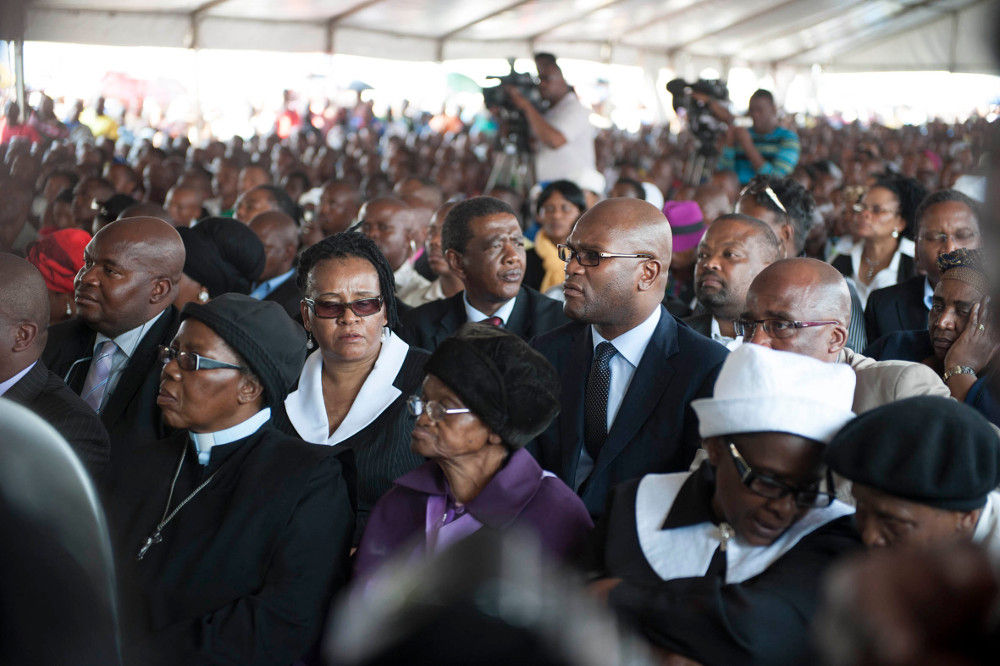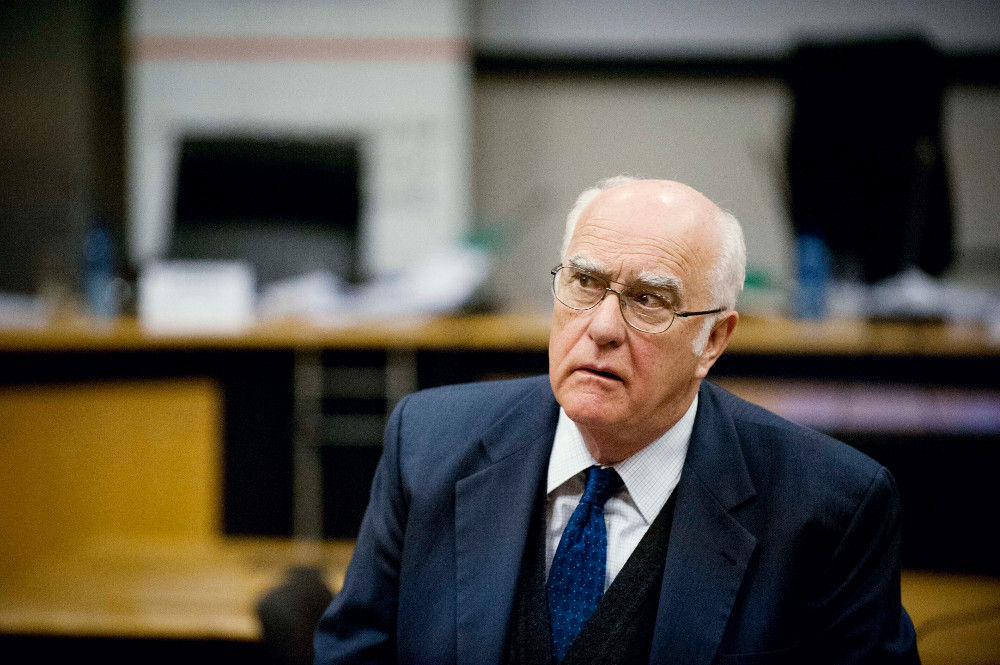Concern has been voiced that the commission will no longer be able to piece together a complete picture of the tragedy.
Police Minister Nathi Mthethwa and ANC deputy president Cyril Ramaphosa will still find themselves in the hot seat at the Farlam commission despite the changes in its terms of reference. Ramaphosa was on mining house Lonmin’s board at the time of the Marikana massacre in August 2012, when police killed 34 striking mineworkers and more than 70 were injured.
Numerous media reports have suggested that the pair will no longer be called to give evidence after an amendment was made to the commission’s terms of reference earlier this month.
The clause that was removed from the terms of reference states: “The role played by the department of mineral resources or any other government department or agency in relation to the incident, and whether this was appropriate in the circumstances and consistent with their duties and obligations according to law” will be investigated by the commission.
This has created an uproar and led to questions about the seeming intention of the state to avoid any form of responsibility for the massacre at Marikana.
A statement issued by the South African Human Rights Commission (SAHRC) points to this. “While it is unlikely to have been the president’s intention, the recent amendment to the terms of reference has the appearance of an attempt to immunise the government from the commission’s findings,” it said. “That appearance is regrettable.”
Amendment
The Socio-Economic Rights Institute of South Africa (Seri) also indicated its concern about the amendment: “Seri remains of the view that, in particular, the minister of police has questions to answer relating to his role in instigating and escalating the police operation that led to the massacre.
“Any failure to require him or any other Cabinet minister in possession of relevant information to testify before the commission would seriously undermine the commission’s credibility,” Seri said.
Seri has sent a letter to the president disagreeing with the removal of the clause and asking for reasons for its deletion. “We don’t agree with the deletion of [clause] 1.5 because there is … evidence that there was government involvement,” Teboho Mosikili of Seri told the Mail & Guardian. He also said that Seri is considering taking legal action for a review of the amendment, depending on the presidency’s response.
The clauses relating to Lonmin’s and the police’s responsibility for the events during and leading up to the Marikana massacre are still intact, however. The commission issued a press statement stating that it had received statements from the minister of police and Ramaphosa “with regard to their role in relation to the conduct of the SAPS during the week of August 9 to 16 2012. As matters currently stand, it is anticipated that they will be called to give oral evidence.” It is still unclear when exactly the pair will give evidence in front of the commission.
Also of concern to various organisations is the final extension given to the commission, forcing it to finish its work by July 31 2014. The final report has to be submitted by the commission six weeks after this deadline.
Grave concern
The SAHRC is among several organisations that have expressed grave concern about both the rushed deadline and the amendment. The commission has sent a letter to President Jacob Zuma’s office asking for reasons for the amendment, and for answers to be given by Friday May 23.
It has also asked him to reconsider the removal of the clause as well as the commission’s deadline, suggesting that the probe would realistically need until the end of this year to complete its mandate thoroughly.

It appears that Police Minister Nathi Mthethwa (about centre) will still testify. (Oupa Nkosi, M&G)
Kathleen Hardy, an attorney for the SAHRC, said she could only guess why the commission was given such a short extension. “There’s speculation that there’s not enough money for the commission to extend beyond July – that’s the budget perspective,” she said.
“Then there’s the removal of state responsibility. This is why we’ve requested reasons from the presidency.”
Mosikili said Seri has written a separate letter to commission chairperson Judge Ian Farlam and copied it to the president, giving a timeline and reasons for why it will be impossible for the commission to finish its work by the end of July. “We listed a number of important witnesses that are still to come and mentioned that Lonmin still has to present its case,” said Mosikili.
It is expected that the various parties will submit a joint letter of representation contesting the July deadline.
Two phases
The commission consists of two phases: the first one that investigates why the massacre occurred and who is responsible for the injuries and deaths, and the second is supposed to investigate the underlying socioeconomic and political causes that led to the events at Marikana. Phase one will now have to be rushed to reach completion, and large portions of phase two, namely those related to the state, will be removed (see “Contextual probes cease, leaving holes about responsibilities”).
“If you look at what’s happening on the platinum belt at the moment, these are things that need to be investigated. We are never going to get to the bottom of anything if phase two is not properly investigated,” Hardy told the M&G.
“Phase one is going to be at a disadvantage, given the time frame. The case around Lonmin hasn’t been fully ventilated yet. A number of police witnesses [have not yet been called], like the shooters from scene one or two.
“The shortening of time frames means we’ve been given limited time for cross-examination and sometimes that’s just not enough time,” she added.
The impact the new deadline is having on the commission is already visible. Before a party cross-examines a witness, Farlam now asks what amount of time they’ve been granted, and a strict timekeeper ensures they stick to it. Parties barter and “donate” time to each other as needed. The persistent badgering of witnesses on minute details for days on end has fallen away, as advocates dive straight to the point, rushing through their questions.
One of the commission’s evidence leaders, Geoff Budlender, confirmed that it is likely that Minister of Mineral Resources Susan Shabangu will also be called to testify at the commission.
Key dates in the Marikana saga
- August 9 2012: Lonmin employees go on strike, demanding a wage increase.
- August 10 2012: The strike becomes violent. Reports of intimidation and assault.
- August 12 2012: Two Lonmin security guards hacked to death by strikers. One other worker dies.
- August 13 2012: Three bodies of mineworkers are found. Two policemen hacked to death by strikers. Three striking miners shot and killed by police.
- August 15 2012: Police continue to attempt negotiations with the strikers.
- August 16 2012: Police open fire on striking mineworkers, killing 34 and wounding over 70, in what has become known as the Marikana massacre.
- August 23 2012: President Jacob Zuma establishes the Farlam Commission of Inquiry to investigate the events at Marikana.
- October 1 2012: The commission begins its work at Rustenburg.
- January 2013: An extension is granted for the commission to continue until May 30 2013.
- June 3 2013: The commission moves from Rustenburg to Centurion, Pretoria.
- June 5 2013: The commission is granted an extension until October 31 2013.
- November 1 2013: The commission is granted an extension until April 30 2014.
- April 25 2014: The presidency grants the commission its final extension, until July 31 2014. The commission has to present its findings six weeks after this deadline.
- May 5 2014: Changes to the commission’s terms of reference are published in the Government Gazette.

A July deadline looms for Judge Ian Farlam. (Madelene Cronjé, M&G)
Contextual probes cease, leaving holes about responsibilities
Phase two of the Marikana commission of inquiry, which investigates the underlying causes of the Marikana massacre, will be severely affected by the recent amendment to the commission’s terms of reference. It removes the clause to investigate the government’s role and responsibilities in events at Marikana in August 2012.
Some of the areas of investigation that now fall away include the responsibility of national, provincial and local government to provide housing and services in Marikana. But Lonmin’s role in what has, what hasn’t and what should be provided in this regard will still be looked into.
The issue on migrant labour used in mining will also only be investigated in as far as it pertains to the situation at Lonmin in 2012. Investigations into the broader themes of migrancy, such as the social costs, the financial burden to migrants of dual households and what the social costs to Pondoland and Lesotho would be if migrancy was phased out, have been halted.
According to a senior researcher at the commission, Kally Forrest, many of the investigations into issues of violence will also fall away, barring those relating to the use of traditional weapons and the South African Police Service, which have largely already been covered in phase one.
The topics on lending and debt collection, and on issues between the Bapo ba Mogale community and royal family and Lonmin, will also fall away.
Although the extent to which Lonmin complied with its social obligations under the social and labour plan and the mining charter will still be examined, the extent to which the department of mineral resources took appropriate steps in relation to any noncompliance will no longer be scrutinised.
Forrest said that it is important that the government’s role is not excluded in order to gain a full picture of what happened. “You have to look at all parties, what their responsibilities are and what they didn’t fulfil,” she said.
“There will be big gaps now around mines – the living conditions, indebtedness and access to services. [Issues relating to] mineworkers living as decent humans have been dropped, but workplace-related issues such as wages and training will all still be investigated. But bringing it all together in a total picture will be difficult. It’s going to be fragmented.”
Kathleen Hardy, an attorney for the South African Human Rights Commission (SAHRC), agrees. “The SAHRC believes that the long-term systematic understanding of conflict at Marikana is as important as the direct reasons for what happened.”
Also affected by the amendment are some of the seminars that were planned as part of phase two. They would have addressed how to provide services to a mining town, as well as the land and planning around mines, including the various responsibilities of the government and mining companies in relation to this.
At this stage it is still unclear whether the topics concerning Lonmin will be incorporated into phase one, or if they will still form part of phase two.